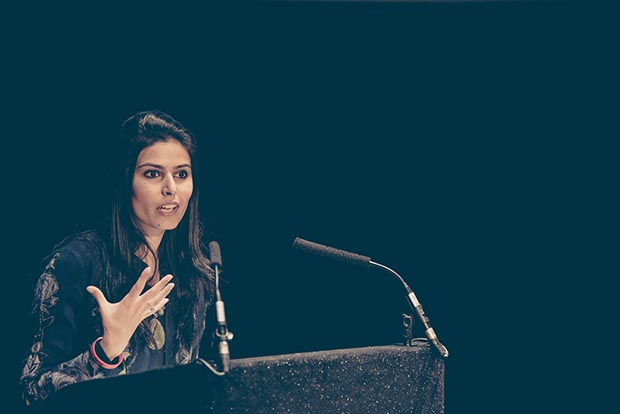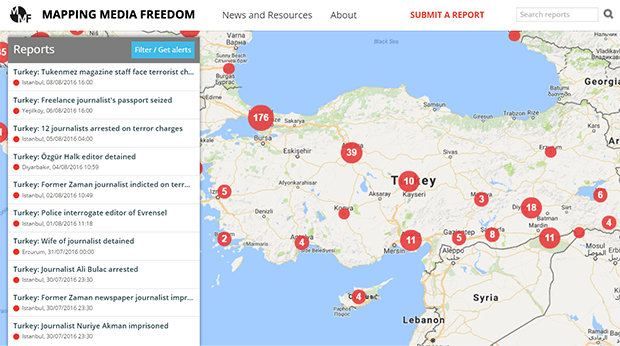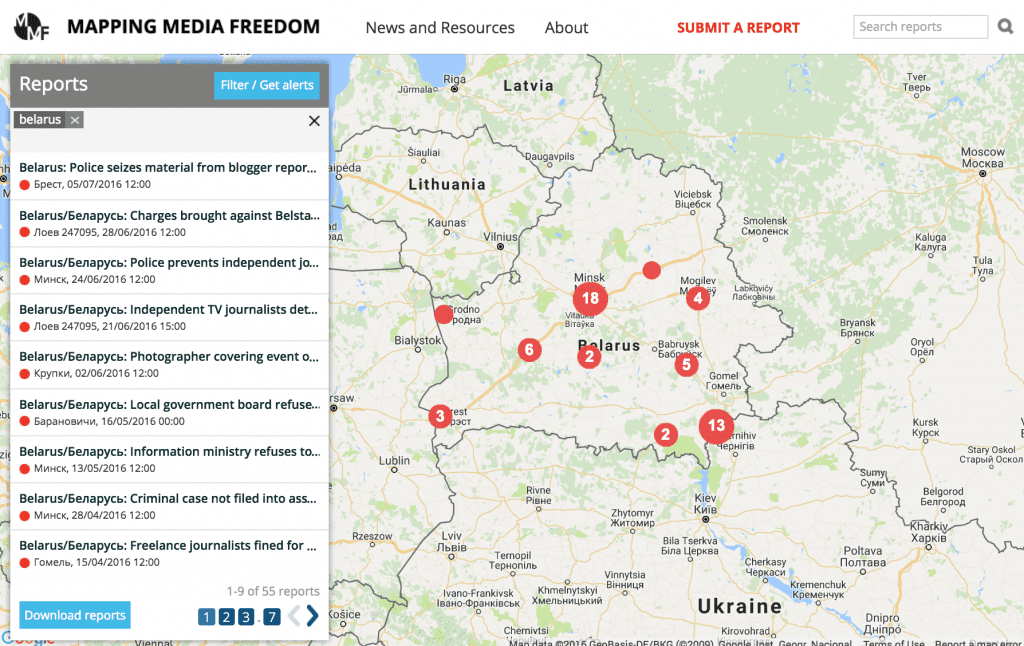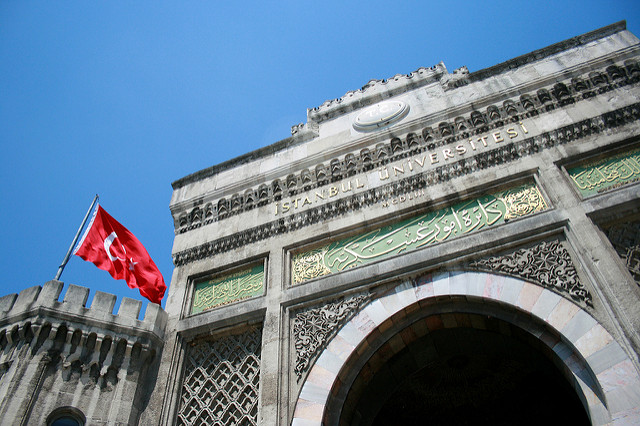11 Aug 2016 | Asia and Pacific, mobile, News and features, Pakistan

Farieha Aziz, director of 2016 Freedom of Expression Campaigning Award winner Bolo Bhi (Photo: Elina Kansikas for Index on Censorship)
Pakistan’s National Assembly passed a controversial Prevention of Electronics Crimes Bill on Thursday 11 August. The bill will permit the Pakistan Telecommunication Authority to manage, remove or block content on the internet.
Many critics say the bill is too overarching and punishments too severe. It also leaves children as young as 10 liable for punishment.
Farieha Aziz, director of Index-award winning Bolo Bhi, the Pakistani non-profit fighting for internet freedom, has been campaigning against the bill for over a year. Last month, Aziz told Index: “It’s part of a regressive trend we are seeing the world over: there is shrinking space for openness, a lot of privacy intrusion and limits to free speech.”
Last week, Aziz was selected by the Young Parliamentarians Forum – a bi-partisan forum with representation from all political parties – as one of the 10 Youth Champions of Pakistan. Yesterday – the day before the bill passed – each recipient was given three minutes to speak to the speaker of the National Assembly, Sardar Ayaz Sadiq, and other parliamentarians.
Yesterday, Aziz used her three minutes to criticise the bill based on the below letter to members of YPF. She emailed a similar letter to Ayaz Sadiq, who left before she gave her speech.
Dear Members of YPF,
Thank you for nominating and selecting me as one of the 10 youth champions of Pakistan.
I stand before you today apparently in recognition of efforts made to secure the rights of Internet users. I regret though that this is no moment for personal recognition or glory, not when the future of the youth of Pakistan stands threatened. What is that threat? The Prevention of Electronic Crimes Bill, which is on today’s orders of the day of the National Assembly, set to receive the approval of parliament and become law.
For over a year, not just I, but many citizens and professionals fought long and hard to fix this bill. We engaged with the government and opposition. Provided input to make the law better. We never said there shouldn’t be a law but that the law needed to respect fundamental rights and due process. While we found many allies among you – parliamentarians without whose efforts it would have been an even more difficult struggle – there were many part of the same system who labelled us as agents and propagandists.
On one occasion, the doors of parliament house were shut upon us. Stack loads of written input was disregarded and we were told we were just noise-makers who’d given nothing at all.
How I wish the certificate awarded today was actually a significantly amended version of the bill. A bill that did not trample on the rights of citizens. A bill that factored in the input we’d provided. I have come here today not for the certificate, but to ask you, if you will commit to the youth of this country beyond certificates?
The youth of this country is losing hope. I come to ask you if you will do all that is in your power to do, to restore it. If you want to give the youth of this country hope, then do not dismiss them. Do not stick labels. Do not isolate them. They don’t need certificates to give them hope. They need to see that things will be done differently – that their input will be considered and that you will constructively engage with them. That you will enter questions, and motions and resolutions on vital issues that concern citizens. That you will wage a struggle within your parties to make them see differently on issues. And that you will use your vote when it counts, and block legislation that seeks to take away our constitutionally guaranteed freedoms and rights.
If the bill is passed today, in its current form, the message that will go out to the youth of Pakistan is that there is no room or tolerance for thinking minds and dissenting voices. Should the youth inquire and raise questions, a harsh fine and long jail term awaits them. Is this the future you want to give the youth of Pakistan? If not, then when you go to the National Assembly today at 3pm, stop the bill from becoming law. Allow time to fix it.
Show the youth of this country that not only will you recognize efforts outside parliament; but that you will also honour these efforts by casting your vote to protect their rights inside parliament too. If you do this, that would be true recognition.
Thank you.
Farieha Aziz
Concerned citizen, digital rights activist and journalist
11 Aug 2016 | Europe and Central Asia, mobile, News and features, Turkey, Turkey Uncensored

The number of threats to media freedom in Turkey have surged since the failed coup on 15 July.
One of the most vital duties of a journalist — in any democracy — is to report on the day-to-day operations of a country’s parliament. Journalism schools devote much time to teaching the deciphering budgets and legal language, and how to report fairly on political divides and debates.
I recalled these studies when I read an email Wednesday morning from an Ankara-based colleague. I smiled bitterly. The message included a link to an article published in the Gazete Duvar, which informed that 200 journalists had been barred from entering the home of the Grand National Assembly of Turkey. Security controls at the two entrances of the failed-coup-damaged building had been intensified and journalists were checked against a list as they tried to enter.
The reason for the bans? Most of those who were blocked worked for shuttered or seized outlets alleged to be affiliated with the Gülenist movement.
Parliament, though severely damaged by bombing during the night of the coup attempt, is still open. For any professional colleague, these sanctions mean only one thing: journalism is now at the absolute mercy of the authorities who will define its limits and content.
Many pro-government journalists do not think the increasingly severe controls are alarming. “It is democracy that matters,” they argue on the social media. “Only the accomplices of the putschists in the media will be affected, not the rest.”
If only that were true. Reality proves the opposite. Along with the closures of more than 100 media outlets, a wide-scale clampdown on Kurdish and leftist media is underway. Outlets deemed too critical of government policies have come under post-coup pressure.
Late Tuesday, pro-Kurdish IMC TV reported that the official twitter accounts of three major pro-Kurdish news sources — the daily newspaper Özgür Gündem and news agencies DIHA and ANF — were banned. Some Kurdish colleagues interpret the sanctions as part of an upcoming security operation in the southeastern provinces of Diyarbakır and Şırnak.
What I see is a new pattern: in the past three-to-four days, many Twitter accounts of critical outlets and individual journalists have been silenced. An “agreement” appears to have been reached between Ankara and Twitter, but no explanation has yet been given.
For days now, many people have been kept wondering about the case of Hacer Korucu. Her husband, Bülent Korucu, former chief editor of weekly Aksiyon and daily Yarına Bakış, is sought by police after an arrest order issued on him about “aiding and abetting terror organisation”, among other accusations. She was arrested nine days ago as police had told the family that “she would be kept until the husband shows up”.
The Platform for Independent Journalism provided more insight on Hacer Korucu’s detention and subsequent arrest. The motive? She had taken part in the activities of the schools affiliated with Gülen Movement and attended the Turkish Language Olympiade.
Hacer Korucu’s case, without a doubt, shows how arbitrary law enforcement has become in Turkey. As a result no citizen can feel safe any longer.
“She is a mother of five,” was the outcry of Rebecca Harms, German MEP. “A crime to be married to a journalist?”
How do we now expect an honest Turkish or Kurdish journalist to answer this question? By any measure of decency, the snapshot of Turkey in the post-putsch days leaves little suspicion: emergency rule gives a free reign to authorities who feel empowered to block journalists from covering the epicenter of any democratic activity — parliament — and let relatives of journalists suffer.
Meanwhile, we are told on a daily basis that democracy was saved from catastrophe on that dreadful July evening and it needs to be cherished.
But, like this? How?
A version of this article originally appeared on Suddeutsche Zeitung. It is posted here with the permission of the author.

Turkey Uncensored is an Index on Censorship project to publish a series of articles from censored Turkish writers, artists and translators.
10 Aug 2016 | Belarus, Europe and Central Asia, Mapping Media Freedom, mobile, News and features

Despite repeated calls by international organisations for reform, Belarus’ regime for press accreditation continues to help the government maintain its monopoly on information in one of the world’s most restrictive environments for media freedom.
The government of president Aleksandr Lukashenko uses the Law on Mass Media to control who reports and on what in an arbitrary procedure that is open to manipulation. While Article 35 sets out journalists’ rights to accreditation, Article 1 of the law defines the process as: “The confirmation of the right of a mass medium’s journalists to cover events organised by state bodies, political parties, other public associations, other legal persons as well as other events taking place in the territory of the Republic of Belarus and outside it.”
By outlining credentialing as a system providing privileges for journalists, Belarus’ accreditation structure is contrary to international standards. The law allows public authorities to choose who covers them by approving or refusing accreditation. It also denies accreditation to journalists who do not work for recognised media outlets. Even journalists who report for foreign outlets must be full-time employees to be able to be accredited by the Belarusian Ministry of Foreign Affairs.
In practice, the law blocks freelance journalists or independent media outlets from covering the activities of the government and makes accreditation a requisite for a career in journalism. Only journalists who work for state-run outlets are accredited to report on state ministries, parliament or local governments.
Though refusing accreditation does not mean a total ban on a journalist’s professional activities, it creates obstacles to access to information. This discriminatory structure is especially acute for freelance journalists and those who work for independent media outlets.
In May 2016, the local government of Baranavichy district, in the Brest region, refused to accredit Julia Ivashka, a reporter for independent newspaper Intex-press. An official letter said the local government does not intend to expand the list of media outlets which are permitted to cover its sessions. The three currently accredited are state-run.
Under the mass media law, freelance journalists who do not have a contract with an outlet have no legal right to ask for accreditation. At the same time these independent reporters do not enjoy the same rights as journalists who work for accredited media outlets, they can also be targeted by the police, who use the lack of accreditation as a pretext to block freelancers from exercising their professional duties.
On 24 June 2016, police officers prevented independent journalists Yuliya Labanava and Ales Lyubyanchuk from filming a public discussion on the planned construction of a new Minsk shopping mall. Police officers then threatened to remove them from the room altogether if they asked any questions.
On 13 May 2016, the ministry of information refused to accredit а correspondent and cameraperson working for BelaPAN – the main independent news agency in the country – at the XI Belarusian International Media Forum in Minsk. This decision prevented BelaPAN from covering the event. The Ministry of Information did not comment on the reasons for the rejection.
Since April 2015, when Index on Censorship’s Mapping Media Freedom project began monitoring threats to media freedom in the country, there have been 28 verified incidents involving blocked access that took place in Belarus. Most of these reports involved freelance or full-time journalists working for independent news outlets, who lack accreditation.
“Belarus’ strictly controlled media environment is part of the government’s overall control of the press and information. The number of reported incidents seems low until you consider that Belarus is one of the most restricted countries in Europe, as it’s considered the continent’s ‘last dictatorship’. This arbitrary and capricious accreditation system must be reformed,” Hannah Machlin, Mapping Media Freedom project officer at Index, said.
In 2014 OSCE representative on Freedom of the Media Dunja Mijatović called on Belarusian authorities to repeal accreditation requirements for foreign and national journalists. “Accreditation should not be a license to work and the lack of it should not restrict journalists in their ability to work and express themselves freely,” Mijatović said.
In the same year the UN Human Rights Committee considered the case of Maryna Koktysh, a journalist working for the independent newspaper Narodnaya Volya. Koktysh was denied accreditation to the House of Representatives of the National Assembly, the lower chamber of the Belarusian parliament. The UN concluded that by creating obstacles to obtaining information, the government violated Koktysh’s right to free expression and recommended a review of Belarusian legislation to prevent similar violations in the future.
10 Aug 2016 | Academic Freedom, Campaigns -- Featured, Europe and Central Asia, mobile, News and features, Turkey, Turkey Uncensored
The stream may be small right now, a trickle, but it is unmistakable. Turkey’s academics and secular elite are quietly and slowly making their way for the exits.
Some months ago, in the age before Turkey’s post-coup crushing of academia, a respected university lecturer told me she was seeking happiness outside Turkey. She was teaching economics at one of Istanbul’s major universities, but neither her nor her husband, who is also in the financial sector, had a desire to remain in the country any longer. They simply packed up and left for Canada.
The growing unease about the future is now accelerating among the academics and mainly secular elite in the country. This well-educated section of society is feeling the pressure more than any other, and as the instability mounts the urge to join the “brain drain” will only increase.
Some of them, particularly those academics who have been fired and those who now face judicial charges for signing a petition calling for a return to peace negotiations with the Kurdish PKK, no longer see a future for their careers. With the government further empowered by emergency rule decrees, the space for debate and unfettered learning is shrinking.
One of the petition’s signatories, the outspoken sociologist Dr Nil Mutluer, has already moved to a role at the well-respected Humboldt University in Berlin to teach in a programme devoted to scholars at risk.
You only have to look at the numbers to realise why more are likely to follow in the footsteps of those who have already left Turkey. In the days after the failed coup that struck at the country’s imperfect democracy, the government of president Recep Tayyip Erdogan swept 1,577 university deans from their posts. Academics who were travelling abroad were ordered to return to the country, while others were told they could not travel to conferences for the foreseeable future. Some foreign students have even been sent home. The pre-university educational system has been hit particularly hard: the education ministry axed 20,000 employees and 21,000 teachers working at private schools had their teaching licenses revoked.
Anyone with even the whiff of a connection to FETO — the Erdogan administration’s stalking horse for the parallel government supposedly backed by the Gulenist movement — is in the crosshairs. Journalists, professors, poets and independent thinkers who dare question the prevailing narrative dictated by the Justice and Development Party will hear a knock at the door.
It appears that the casualty of the coup will be the ability to debate, interrogate and speak about competing ideas. That’s the heart of academic freedom. The coup and the president’s reaction to it have ripped it from Turkey’s chest.
But it’s not just the academics who are starting to go. The secular elite and people of Kurdish descent that are also likely to vote with their feet.
Signs are, that those who are exposed to, or perceive, pressure, are already doing this. Scandinavian countries have noted an increase in the exodus of the Turkish citizens. Deutsche Welle’s Turkish news site reported that 1719 people sought asylum in Germany in the first half of this year. This number already equals the total of Turkish asylum seekers who registered during the whole of 2015. Not surprisingly, 1510 of applications in 2016 came from Kurds, who are under acute pressure from the government.
The secular (upper) middle class is also showing signs of moving out. The economic daily Dünya reported on Monday that the number of inquiries into purchasing homes abroad grew four-to-five times the pre-coup level. Many real estate agencies, the paper reported, are expanding their staff to meet the demand. Murat Uzun, representing Proje Beyaz firm, told Dünya:
“The demand is growing since July 15 by every day. Emergency rule has also pushed up the trend. These people are trying to buy a life abroad. Ten to twelve people visit our office every day….Many ask about the citizenship issues.”
Adnan Bozbey, of Coldwell Banker, told the paper that people were asking him: “Is Turkey becoming a Middle Eastern country?”
According to Dünya, the USA, Ireland, Portugal, Greece, Malta and Baltic countries are popular among those who want to seek life prospects elsewhere.
In short, the unrest is spreading. Unless the dust settles and the immense political maneuvering about the course Turkey is on reverses, it would be realistic to presume that a significant demographic shift will take place in the near future.
A version of this article originally appeared on Suddeutsche Zeitung. It is posted here with the permission of the author.

Turkey Uncensored is an Index on Censorship project to publish a series of articles from censored Turkish writers, artists and translators.





